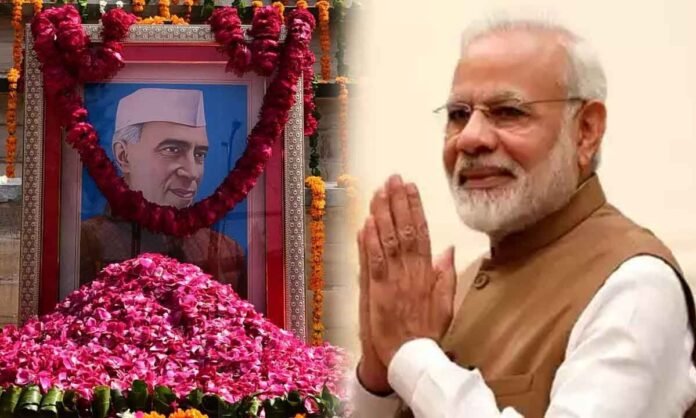As the nation commemorates the 60th death anniversary of India’s first Prime Minister, Jawaharlal Nehru, political leaders from various quarters have come together to pay homage to the towering figure who played a pivotal role in shaping the destiny of modern India. From Prime Minister Narendra Modi to senior Congress leaders, the occasion has served as a moment of reflection on Nehru’s enduring legacy and his contributions to the nation.
Prime Minister Narendra Modi led the tributes, acknowledging Nehru’s vision and leadership in laying the foundation of India’s democratic institutions and guiding the country through its formative years. In a tweet, PM Modi described Nehru as a stalwart who dedicated his life to the service of the nation, leaving an indelible mark on India’s journey towards progress and prosperity.
Leaders of the Congress party, the political home of Nehru, also paid their respects to the iconic leader, highlighting his role in the struggle for independence and his commitment to secularism and social justice. Congress President Sonia Gandhi, in a statement, hailed Nehru as the architect of modern India, emphasizing his unwavering belief in democracy, pluralism, and inclusive development.
The 60th death anniversary of Jawaharlal Nehru serves as an occasion for the nation to reflect on his visionary leadership and his enduring legacy as a statesman, scholar, and institution-builder. Nehru’s contributions to nation-building encompass a wide array of domains, including education, science, technology, and foreign policy. His emphasis on scientific temper and rational thinking laid the groundwork for India’s progress in the fields of science and technology.
Moreover, Nehru’s commitment to social justice and economic development laid the foundation for India’s socialist policies and welfare programs aimed at uplifting the marginalized sections of society. His advocacy for land reforms, industrialization, and public sector development set the stage for India’s economic trajectory in the decades following independence.
Nehru’s foreign policy principles, characterized by non-alignment and support for decolonization, played a crucial role in shaping India’s global identity and its stance on international issues. His emphasis on peaceful coexistence and diplomacy earned India respect on the world stage and laid the groundwork for its role as a leader of the non-aligned movement.
On this solemn occasion, it is imperative for the nation to not only remember Nehru’s contributions but also to imbibe the values and principles he espoused. Nehru’s commitment to secularism, pluralism, and social harmony remains as relevant today as it was during his time. In an increasingly polarized world, his vision of a diverse and inclusive India serves as a guiding light for the nation.
As India navigates through the challenges of the 21st century, the ideals championed by Jawaharlal Nehru continue to resonate across generations. His emphasis on education as the key to national development underscores the importance of investing in human capital and fostering a culture of innovation and creativity.
In paying tribute to Nehru on his 60th death anniversary, political leaders across the spectrum reaffirm their commitment to upholding the values of democracy, secularism, and social justice that he cherished. The occasion serves as a reminder of the rich legacy left behind by one of India’s foremost nation-builders and the responsibility incumbent upon future generations to uphold his vision of a vibrant and inclusive India.
In addition, as the nation commemorates the 60th death anniversary of Jawaharlal Nehru, it is an opportune moment to reflect on his contributions to India’s growth and development and to rededicate ourselves to the ideals he stood for. Nehru’s legacy transcends political boundaries and serves as a beacon of hope for a better and brighter future for India and its people.

